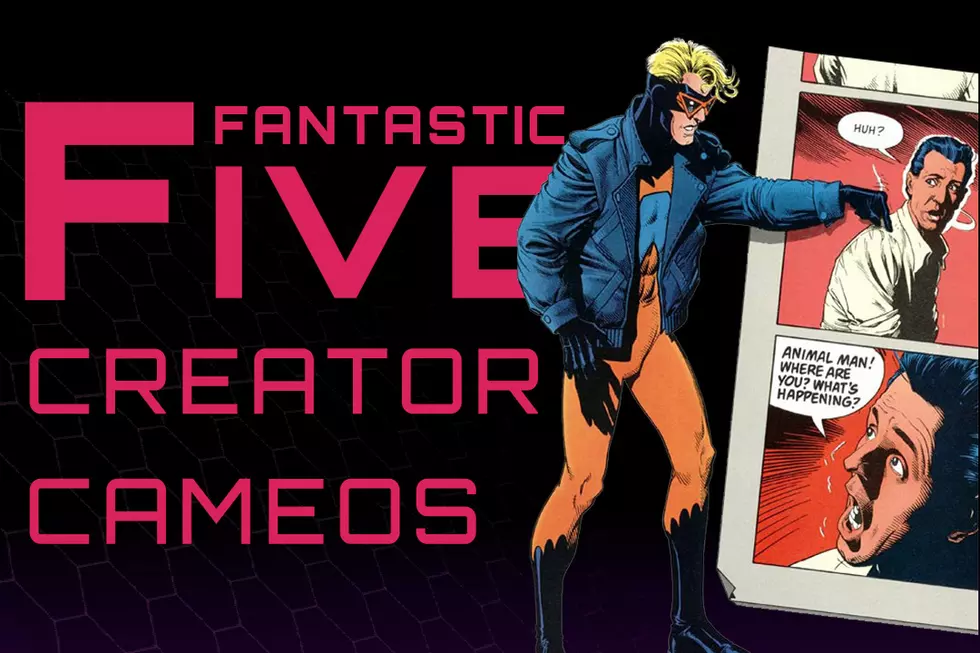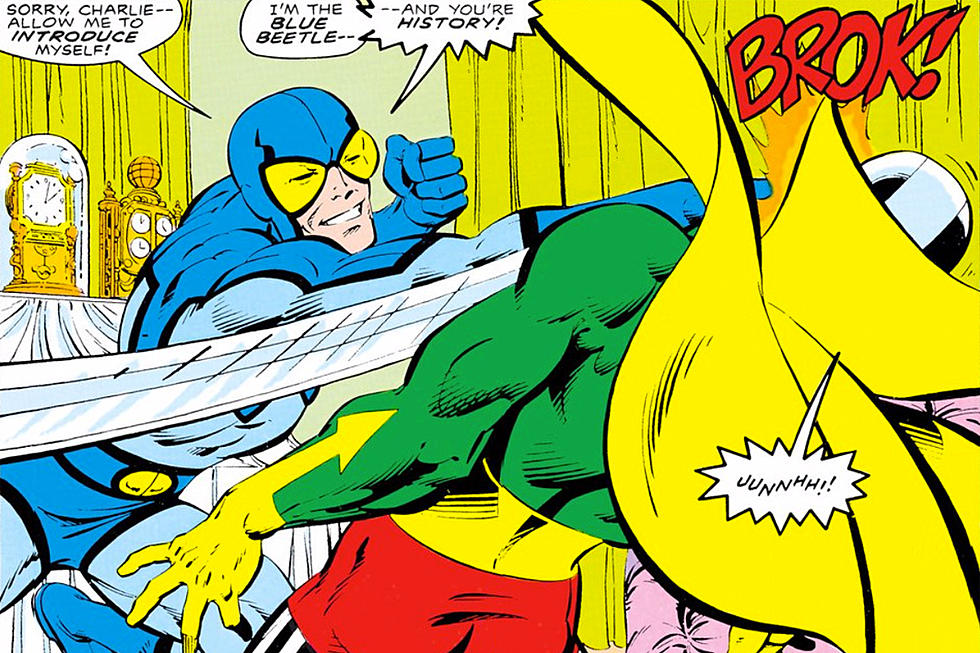
Ask Chris #211: Imagine The Words ‘The Enforcers’ With A Big Heart Drawn Around Them
Q: We know your favorite anti-heroes, sidekicks, and villains, but who's your favorite minor villain, and why? -- @fizzbang
A: Y'know, the way you phrase that question makes it sound like I've written about everything except who my favorite superhero is, and... that doesn't sound right. I'm a little too lazy to go and look, but it feels like surely at some point in the last 210 columns, I probably would've mentioned that. Oh well, I'm sure I'll probably get to talking about Batman at some point.
Anyway, back to the question. Favorite minor villains? OH MY GOD, IT'S THE ENFORCERS I LOVE THE ENFORCERS SO MUCH LET'S TALK ABOUT FANCY DAN FOR THE NEXT THREE HOURS OH MY GOD.
Sorry. I... I get a little excited sometimes. But, I mean, Fancy Dan, y'all. He fights Spider-Man and Daredevil with karate while dressed like a gangster from the '40s and his name is Fancy Dan. So great. So, so great.
Now, I like a lot of villains that are, by all reasonable standards, pretty terrible. Heck, if you missed it, you can hear me on the ComicsAlliance Top Ten last week extolling the virtues of Johnny Karaoke, and that dude appeared and died in two issues where he wasn't even the main villain. Clearly, I tend to be drawn to the villains who never quite made it, and a lot of that is because I'm fascinated by what didn't work about them, and how there are characters that have interesting hooks that just didn't catch on, whether it's because they just hit at the wrong time or were overshadowed by bigger stars.n
But there's a difference between that kind of character and the "minor villain," the ones who may not be the world-shaking threats or the big names, but have hung in there for years, occasionally popping up to cause only marginal amounts of trouble. And if that's the definition we're working on here (and assuming that you charitably bump my other favorite, Arcade, up to the major leagues) then nobody embodies that idea more than the Enforcers.
The Enforcers are most commonly identified as Spider-Man villains -- they first appear all the way back in Stan Lee and Steve Ditko's Amazing Spider-Man #10 from 1964 and have popped up in more Spider-Man stories than anywhere else by far -- but I've never really thought of them that way for one simple reason.
See, I first encountered the the pages of Daredevil #356, during Karl Kesel and Cary Nord's run on the title. I've said it before, but that run is easily one of the most underrated comics of the '90s. It had the kind of slightly brighter, swashbuckling adventure that would serve Mark Waid, Paolo Rivera, Marcos Martin and Chris Samnee's run so well in their justifiably beloved tenure, but it had the misfortune of being sandwiched between the floundering and forgettable darkness of the Post-Miller, Post-Nocenti years, and the Kevin Smith relaunch that would eventually lead to the depressing grind that was Matt Murdock's life hitting a critical mass of Funky Winkerbeanean despair.
For about a year, though, Kesel and Nord were able to do that more lighthearted Daredevil, and part of their mission statement was skewing away form the standard roster of villains like Kingpin, Bullseye and Elektra and instead throwing the focus onto stories with a roster of relatively minor villains like Mr. Hyde, the Eel and, of course, The Enforcers.
To be honest, the actual story about the Enforcers isn't really anything special. It's a solid superhero comic, you understand, and it's got the line "Let's see how he likes the kung fu footwork of Fancy Dan!" shouted by a man doing a jump-kick and that's pretty great, but It's not going to change the world or anything. It did, however, impress upon me that the Enforcers weren't necessarily tied to a single hero, and I love villains like that.
That's one of the things that the Marvel Universe has in abundance that DC never really developed. I think it comes form DC being an inherently more fragmented universe; since the heroes weren't necessarily developed with the idea that they would eventually coexist, they ended up having rogues galleries that were built entirely around one specific hero, meant to reinforce very specific themes.
That's not really a bad thing, either. I don't think anyone could say that DC doesn't have some pretty great villains, but it means that they don't work that well outside of a particular context. They always want it to be a big deal when the Joker shows up to fight Superman, but it never really works the way they want it to. There are a couple of groups that feel like they should fill this role -- if I had my way, the Royal Flush Gang would be everywhere at all times -- but there aren't many.
The Marvel Universe, on the other hand, is a lot more utilitarian. There's a level of cohesiveness that comes from being created by a much smaller group of creators -- particularly Lee, Kirby and Ditko -- but at the end of the day, there's a lot of stuff that's just in there to make their jobs easier. The idea of mutants alone, which would grow to form the most successful corner of the universe, was famously introduced so that the creators wouldn't have to spend so much time thinking about origin stories.
There are still plenty of arch-nemeses that revolve around a single hero, but when you approach building a universe the way Marvel did, you end up with a lot of stuff that you can switch around; bits and pieces like AIM, or even major villains that feel like they could show up to fight anyone.
Which brings us back to the Enforcers. Who, incidentally, had to be the easiest creations those dudes ever cooked up. It's one of the things I actually find really appealing about them: They're such a dumb, thoroughly generic idea. There is a strong guy named Ox (because he is as strong as an ox, you see), a little tiny dude who knows kung fu, which as we all know is a very fancy way of fighting, and a frigging cowboy. It is so beautifully generic that it almost had to happen, a completely standard gang of thugs, but they have just enough personality, and they make just enough of a weird combination, that they end up standing out.
Maybe the best thing about these dudes is that they feel like guys who are just doing their crappy jobs. Okay, no, the best thing is still that one of them is named Fancy Dan and he's a kung fu master in a pinstripe suit with a terrible moustache, but after that, it's the job thing. I've got a real soft spot for occupational supervillains who are pretty much just in it for the check, and the Enforcers are exactly that. It's right there in the name: they're not the boss, just the professional henchmen.
It's been like that since the beginning, too. They first appear as lackeys of the Big Man, and then show up again four issues later working for the Green Goblin, who uses them in an astonishingly complex plot involving staging an entire fake film production:
For the record, this is not the first time in the early '60s that a Marvel supervillain would attempt to kill someone by faking a movie. They really ought to bring that back.
But it all just reinforces that idea of the Enforcers as working stiffs. You kind of get the idea that if it wasn't for the fact that they were constantly dealing with people who can throw cars or have radioactive ninja senses, they'd probably be complete badasses.
Seriously, Montana is a guy who tries to fight superheroes by throwing a rope at them. Not even a trick rope or a magic rope, things that actually exist in his universe. Just a rope. Surely he wouldn't do that if he wasn't so good at lassoing regular people that he actually thinks he can accomplish something with a rope. But here they are, in a world where their main antagonist shoots super-awesome science ropes out of his wrists, and they still have to do their job.
In a way, it's admirable. If they weren't all trying to kill people all the time, I mean.
Either way, the Enforcers endure as my favorite gang of miscreants in comics, this great combination of a dumb idea done perfectly (which applies to a heck of a lot of stuff from the early days of Marvel, now that I think of it), bad guys who are just showing up to do their job, and being just weird enough to endure. Which, I suppose, is why they're around even today, in what is unquestionably the greatest Spider-Man saga of our time:
Ask Chris art by Erica Henderson. If you’ve got a question you’d like to see Chris tackle in a future column, just send it to @theisb on Twitter with the hashtag #AskChris.
More From ComicsAlliance



![Don’t Lose Your Head Over ‘Immortal Brothers: Tale Of The Green Knight’ [Preview]](http://townsquare.media/site/622/files/2017/03/GreenKnight01.jpg?w=980&q=75)


![The Unvarnished, Unpretty, Unchivalrous Truth: Fred Van Lente On ‘Immortal Brothers: The Tale Of The Green Knight’ [Interview]](http://townsquare.media/site/622/files/2017/01/ImmortalBros.jpg?w=980&q=75)
![Friendly, Wholesome, And Tough: David Hahn And Karl Kesel On The Art Of ‘Batman ’66 Meets Wonder Woman ’77’ [Interview / Preview]](http://townsquare.media/site/622/files/2017/01/B66a.jpg?w=980&q=75)

